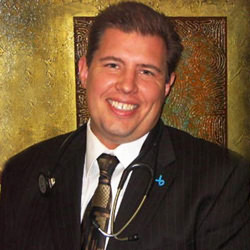PSA and the prostate
Prostate Second Opinions
 Dr. Phranq Tambouri, NMD of Prostate Second Opinions in Scottsdale, Phoenix and Seattle is an expert in the field of men’s health and the prostate.
Dr. Phranq Tambouri, NMD of Prostate Second Opinions in Scottsdale, Phoenix and Seattle is an expert in the field of men’s health and the prostate.
I attended a presentation of what he does with men to save their prostates while carefully screening for prostate cancer. I am summarizing here some important points that men and women who love them should know about the prostate and cancer.
More information from Dr. Tambouri is available at Longevity Medical Center.
The PSA (Prostate Specific Antigen)
The PSA is the blood test that most of us are familiar with. In 1986, it was approved by the FDA to monitor the progression of prostate cancer in men who had already been diagnosed. Then in 1994 it was approved as an adjunct to the digital rectal exam to screen for prostate cancer.
iHealthTube.com – Is The PSA A Reliable Prostate Cancer Test? Yes And No
The PSA is often elevated in men with prostate cancer, but not in all cases. And prostate cancer is not the only cause of elevated PSA on testing. An infection of the prostate or urinary tract or biopsy or surgery can cause elevated levels. That leaves a lot to clinical decision.
How high is elevated?
The official number is a PSA greater than 4.0 nanograms per milliliter of blood. This demands a biopsy to determine if there is cancer present.
Unofficially, urologists use the number of 2.0 ng/ml to begin investigation through biopsy.
But an isolated number may be misleading, so it is important to track over time. One hitch is that insurance companies may only cover the PSA test once to twice a year. That leaves the patient either paying out of pocket or not getting tested enough to catch a progressing trend.
What are some of the PSA number patterns, and what do they mean?
If the PSA has elevated more than 0.75 ng/ml in one year, that is a dangerous rise. It may already be too late, as cancer can be active and spreading.
A slow linear curve of increasing PSA may reflect Benign Prostatic Hypertrophy (BPH), a benign condition in which the cells of the prostate increase, and so the volume of the gland also increases.
If the pattern of PSA is escalator-like, moving two steps up, one step down, this may be due to active cancer which is also metastasizing to other parts of the body.
If there is a variation between a stable highest PSA number and stable lowest PSA number, this may reflect an infection or inflammation of the prostate called prostatitis. The number variation reflects inflammation increase and decrease.
Are there any other tests?
Yes. The PAP (Prostatic Acid Phosphatase) test was used previously and replaced by the PSA. But it is used now primarily to determine moderate and high-risk prostate cancer prognosis. If PSA is elevating, this test can be run.
The PAP is an enzyme produced by the prostate, and usually elevated with prostate cancer. Other influences can elevate it such as biopsy, certain medications, and bone and blood diseases.
On blood testing, the PAP is normal below 2.8, and when it reaches 3.0 further diagnosis is needed.
What about taking into consideration the size of the prostate?
Yes, there is a test which measures density of the prostate, called the PSAD. It is a calculation of the total PSA divided by the prostate volume.
Logically, a larger prostate can make more antigen, this calculation takes that into account and allows for a high PSA due to more cells in the gland making the prostate specific antigen. This will distinguish between benign prostatic hypertrophy and prostate cancer. The healthy range is consider less than 0.15.
Here is Dr. Tambouri discussing these tests:
iHealthTube.com – Options for Prostate Cancer Tests
What is the danger of prostate cancer?
Urologists talk about dying with prostate cancer versus dying of prostate cancer. There are slow growing prostate cancers that will not kill a man, and at most, will cause problems when it blocks the prostatic urethra, so the man cannot urinate.
In this case, active surveillance can be the top treatment option. The prostate is checked over time, and nothing else done until there is a significant change. Surveillance is fine with a PSA less than 10ng/ml and % free PSA greater than 10%. In addition, if the PSA has not climbed more than 0.75ng/ml for 2 to 3 years in a row, there is little risk.
The real danger is when prostate cancer escapes the prostatic capsule through the nerves and seminal vesicles, and metastasizes in the body.
What do you do if you have been diagnosed with prostate cancer?
iHealthTube.com – Important Tip After Prostate Cancer Diagnosis
What are the signs of metastatic prostate cancer?
- On blood test:
- PSA > 10 ng/ml
- PSAD > 0.15
- PAP > 2.8 ng/ml
- Found on lymph node biopsy
Dr. Tambouri noted that although a nuclear whole body scan, CT, PET, or MRI may be ordered, it cannot be diagnosed solely by this imaging.
What About Prostate Cancer Treatments?
iHealthTube.com – What You Need to Know About Prostate Cancer Treatments!
What are ways to prevent prostate cancer?
iHealthTube.com – You Won’t Believe These Prostate Cancer Prevention Tips!
What other resources are recommended?
Dr. Tambouri recommends the book Invasion of the Prostate Snatchers by Ralph H. Blum and Dr. Mark Scholz.
“a provocative and frank look at the bewildering world of prostate cancer, from the current state of the multibillion-dollar industry to the range of available treatments.”
Have you sought alternative treatment for your prostate or that of a loved one?
WANT TO USE THIS ARTICLE IN YOUR NEWSLETTER OR WEB SITE? You can, as long as you include this complete blurb with it: “Naturopathic Physician Dr. Cheryl Kasdorf is a doctor who listens and has answers with a natural approach that works. She is known as the go-to person to get back your get-up-and-go when it is gone, gone, gone. Get your FREE gift “Dr. Kasdorf’s Health Secrets for Feeling & Looking Great” at drcherylkasdorf.com




